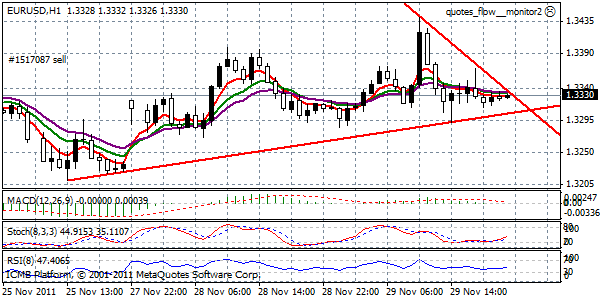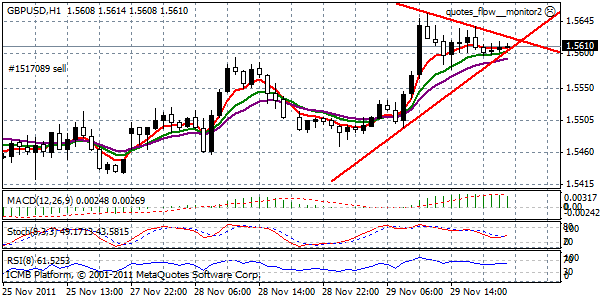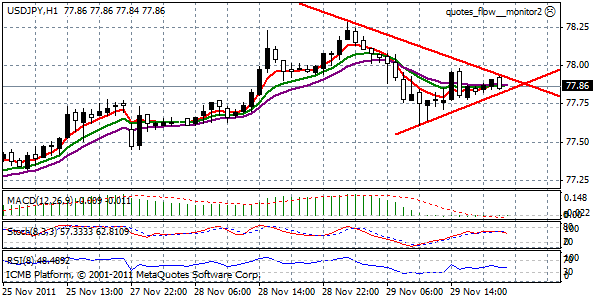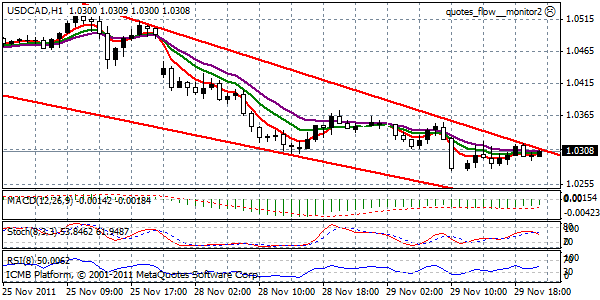EUR/USD
Euro-area finance ministers approved a 5.8 billion-euro ($7.7 billion) loan to Greece under last year’s bailout after eliciting budget-austerity pledges from Greek political leaders backing a unity government, a European official said. The finance chiefs from the 17 nations using the euro cleared the payment at a meeting today in Brussels, said the official, who spoke on condition of anonymity. The go-ahead for the sixth disbursement of funds under the fully taxpayer-funded package of 110 billion Euros shifts the spotlight to a second rescue of Greece that foresees 50 percent losses for private investors in Greek bonds. The new aid plan, crafted at an October summit, also includes 130 billion Euros in extra public funds. After initially endorsing the next loan for Greece on Oct. 21, the euro area froze the payment this month because former Socialist Premier George Papandreou called a referendum on the rescue plan. He later called off the vote, resigned and was succeeded by ex-central banker Lucas Papademos, whose interim government has the support of three parties to press ahead with budget cuts needed for continued aid.“In Greece, we have all the necessary conditions in order to go ahead with the next disbursement,” Greek Finance Minister Evangelos Venizelos said in an e-mailed statement today before the decision in Brussels. “We have the necessary political consensus; we have the necessary national unity and also the national commitment and determination to go ahead.”

GBP/USD
The U.K.’s bank levy is being raised for a second time to ensure the Treasury raises 2.5 billion pounds ($3.9 billion) annually, Chancellor of the Exchequer George Osborne said. The rate will increase the levy to 0.088 percent starting on Jan. 1, Osborne said in his end-of-year statement to the House of Commons today. British lenders have shrunk their balance sheets, meaning forecast tax revenues have also contracted. Eight months ago, the government raised the levy rate for next year to offset a planned cut in corporation tax. At the time, Osborne said he would increase the rate to 0.078 percent from January. Corporation tax will be reduced by 2 percentage points in April and will be cut by 1 percentage point in each of the following three years, offsetting some of the impact for British companies, banks included.“The banks are committed to playing their part in restoring the public finances through the many different taxes they pay,” British Bankers’ Association Chief Executive Officer Angela Knight said in an e-mailed statement today. “But a stable tax regime is important: banks of all nationalities do business around the world from here and they pay tax here. Certainty is an important requirement.”

USD/JPY
Samurai bonds are heading toward the first annual loss in three years as investors dump bonds of Europe’s banks following the downgrade to junk of Norway’s Eksportfinans ASA. Notes denominated in yen by the trade-finance company have lost 1.7 percent this month through Nov. 28, driving the 1 percent loss in bank notes, according to the Bank of America Merrill Lynch Japan Samurai Index. The gauge declined 0.6 percent this year, set for the first drop since defaults by Lehman Brothers Holdings Inc. and Kaupthing Bank Hf of Iceland inflicted a 6.8 percent loss on investors in 2008. Government bonds in Japan have gained 1.5 percent while the nation’s corporate debt lost 1.6 percent this year. Moody’s Investors Service reduced Eksportfinans’s rating on Nov. 22 by seven steps to Ba1, or one level below investment grade, after Norway’s government declined to exempt the lender from European Union regulatory capital requirements. The downgrade may damp demand for Samurai notes sold by European borrowers, down 67 percent in the second half of this year, as the sovereign-debt crisis that started in Greece two years ago spreads to even the safest economies in the region.“The Scandinavian agency, which used to be relatively reliable, got these massive downgrades and I don’t know what to believe now,” said Hiroshi Nakamura, who helps oversee 3.3 trillion yen ($42 billion) as general manager of fixed-income investment at Mizuho Asset Management Co. in Tokyo. “There will be an impact in the market for sure, as investors will shun Samurai they don’t really understand.”

USD/CAD
Canada’s dollar rose as American consumer confidence increased in November by the most in more than eight years, boosting appetite for higher-yielding assets. The currency appreciated for a fourth day versus its U.S. counterpart in its longest stretch of gains since July, trimming its monthly loss to 2.8 percent. Canada’s third-quarter current account deficit narrowed from the second largest on record as aircraft and metals led a rebound in exports. “It’s a risk-on story today,” Rahim Madhavji, president of Knightsbridge Foreign Exchange Inc., said in a telephone interview from Toronto. “Consumer confidence in the U.S. has been surprisingly positive.”Canada’s currency, also known as the loonie for the image of the aquatic bird on the C$1 coin, gained 0.3 percent to C$1.0310 per U.S. dollar at 2:21 p.m. in Toronto. It earlier rose to C$1.0259, the strongest since Nov. 18. One Canadian dollar buys 96.99 U.S. cents. The current account deficit narrowed in July through September to C$12.1 billion, Statistics Canada said today in Ottawa. The current account is the broadest measure of international trade, encompassing goods, services and investment. The third-quarter shortfall was the 12th straight and followed a C$16.1 billion deficit. Economists surveyed by Bloomberg News had forecast a gap of C$11.1 billion, according to the median of 17 responses.

Euro-area finance ministers approved a 5.8 billion-euro ($7.7 billion) loan to Greece under last year’s bailout after eliciting budget-austerity pledges from Greek political leaders backing a unity government, a European official said. The finance chiefs from the 17 nations using the euro cleared the payment at a meeting today in Brussels, said the official, who spoke on condition of anonymity. The go-ahead for the sixth disbursement of funds under the fully taxpayer-funded package of 110 billion Euros shifts the spotlight to a second rescue of Greece that foresees 50 percent losses for private investors in Greek bonds. The new aid plan, crafted at an October summit, also includes 130 billion Euros in extra public funds. After initially endorsing the next loan for Greece on Oct. 21, the euro area froze the payment this month because former Socialist Premier George Papandreou called a referendum on the rescue plan. He later called off the vote, resigned and was succeeded by ex-central banker Lucas Papademos, whose interim government has the support of three parties to press ahead with budget cuts needed for continued aid.“In Greece, we have all the necessary conditions in order to go ahead with the next disbursement,” Greek Finance Minister Evangelos Venizelos said in an e-mailed statement today before the decision in Brussels. “We have the necessary political consensus; we have the necessary national unity and also the national commitment and determination to go ahead.”

GBP/USD
The U.K.’s bank levy is being raised for a second time to ensure the Treasury raises 2.5 billion pounds ($3.9 billion) annually, Chancellor of the Exchequer George Osborne said. The rate will increase the levy to 0.088 percent starting on Jan. 1, Osborne said in his end-of-year statement to the House of Commons today. British lenders have shrunk their balance sheets, meaning forecast tax revenues have also contracted. Eight months ago, the government raised the levy rate for next year to offset a planned cut in corporation tax. At the time, Osborne said he would increase the rate to 0.078 percent from January. Corporation tax will be reduced by 2 percentage points in April and will be cut by 1 percentage point in each of the following three years, offsetting some of the impact for British companies, banks included.“The banks are committed to playing their part in restoring the public finances through the many different taxes they pay,” British Bankers’ Association Chief Executive Officer Angela Knight said in an e-mailed statement today. “But a stable tax regime is important: banks of all nationalities do business around the world from here and they pay tax here. Certainty is an important requirement.”

USD/JPY
Samurai bonds are heading toward the first annual loss in three years as investors dump bonds of Europe’s banks following the downgrade to junk of Norway’s Eksportfinans ASA. Notes denominated in yen by the trade-finance company have lost 1.7 percent this month through Nov. 28, driving the 1 percent loss in bank notes, according to the Bank of America Merrill Lynch Japan Samurai Index. The gauge declined 0.6 percent this year, set for the first drop since defaults by Lehman Brothers Holdings Inc. and Kaupthing Bank Hf of Iceland inflicted a 6.8 percent loss on investors in 2008. Government bonds in Japan have gained 1.5 percent while the nation’s corporate debt lost 1.6 percent this year. Moody’s Investors Service reduced Eksportfinans’s rating on Nov. 22 by seven steps to Ba1, or one level below investment grade, after Norway’s government declined to exempt the lender from European Union regulatory capital requirements. The downgrade may damp demand for Samurai notes sold by European borrowers, down 67 percent in the second half of this year, as the sovereign-debt crisis that started in Greece two years ago spreads to even the safest economies in the region.“The Scandinavian agency, which used to be relatively reliable, got these massive downgrades and I don’t know what to believe now,” said Hiroshi Nakamura, who helps oversee 3.3 trillion yen ($42 billion) as general manager of fixed-income investment at Mizuho Asset Management Co. in Tokyo. “There will be an impact in the market for sure, as investors will shun Samurai they don’t really understand.”

USD/CAD
Canada’s dollar rose as American consumer confidence increased in November by the most in more than eight years, boosting appetite for higher-yielding assets. The currency appreciated for a fourth day versus its U.S. counterpart in its longest stretch of gains since July, trimming its monthly loss to 2.8 percent. Canada’s third-quarter current account deficit narrowed from the second largest on record as aircraft and metals led a rebound in exports. “It’s a risk-on story today,” Rahim Madhavji, president of Knightsbridge Foreign Exchange Inc., said in a telephone interview from Toronto. “Consumer confidence in the U.S. has been surprisingly positive.”Canada’s currency, also known as the loonie for the image of the aquatic bird on the C$1 coin, gained 0.3 percent to C$1.0310 per U.S. dollar at 2:21 p.m. in Toronto. It earlier rose to C$1.0259, the strongest since Nov. 18. One Canadian dollar buys 96.99 U.S. cents. The current account deficit narrowed in July through September to C$12.1 billion, Statistics Canada said today in Ottawa. The current account is the broadest measure of international trade, encompassing goods, services and investment. The third-quarter shortfall was the 12th straight and followed a C$16.1 billion deficit. Economists surveyed by Bloomberg News had forecast a gap of C$11.1 billion, according to the median of 17 responses.

